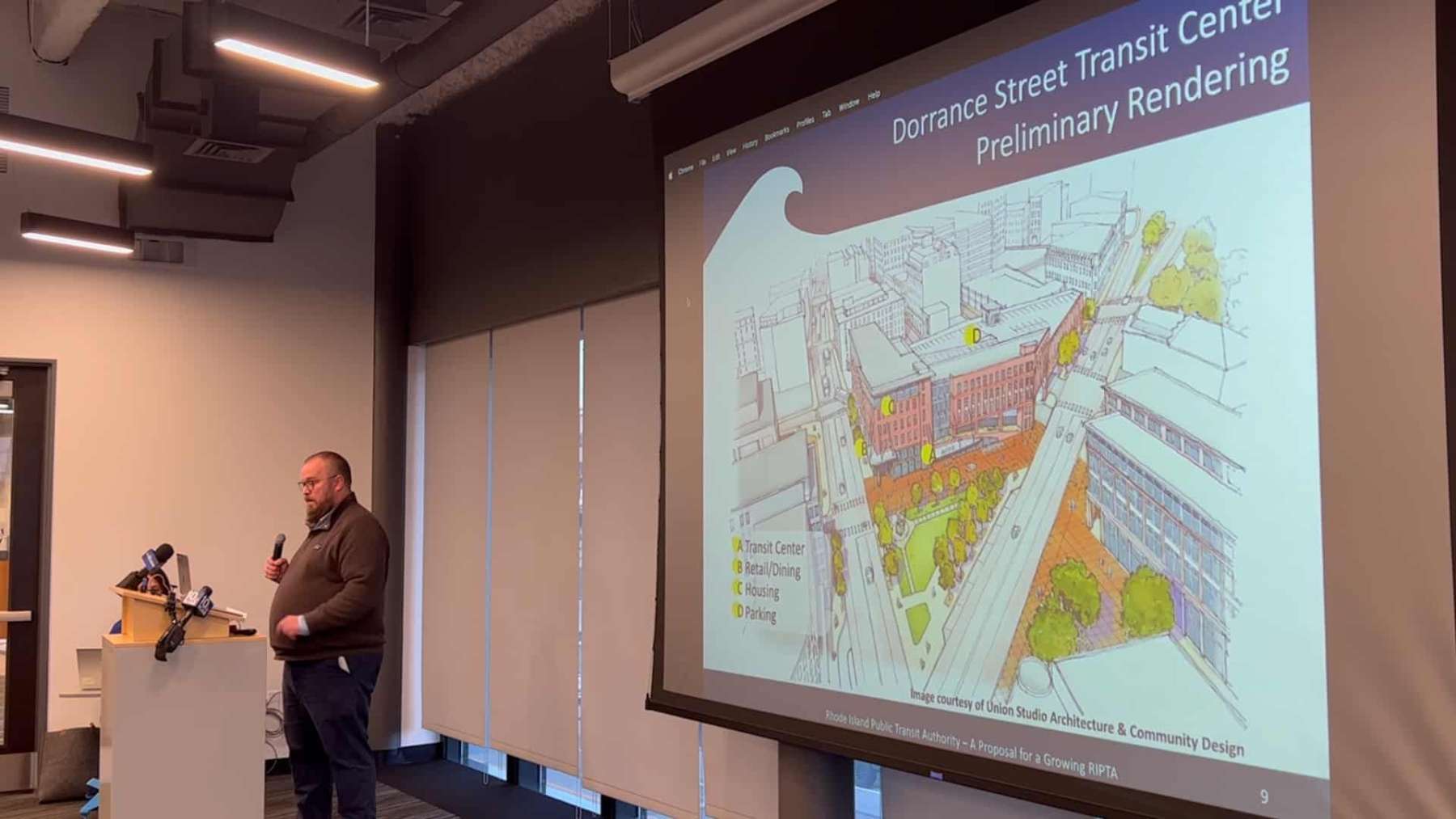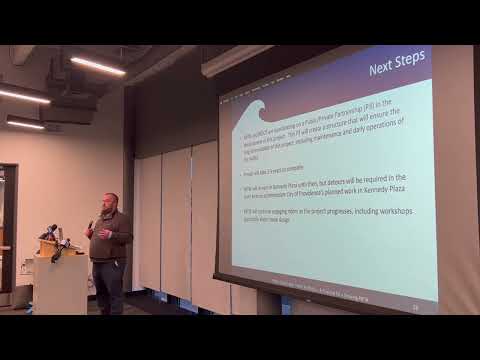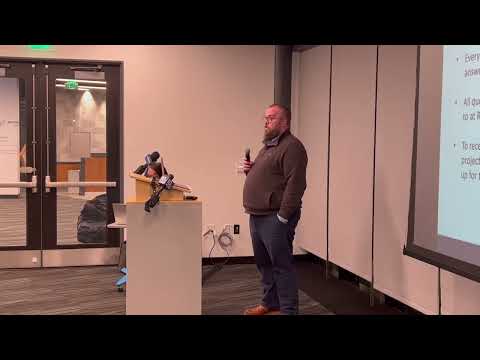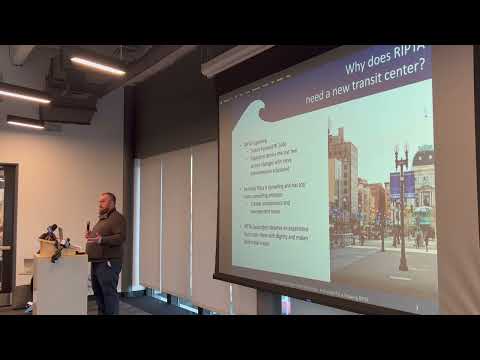Proposed bus hub to rely on privatization for funding – What are we giving away in the process?
“Here’s the thing,” said privatization expert Donald Cohen. “There’s only one group of people that will pay back the hundred million in debt. Only one. Us. We’ll pay with taxes. We’ll pay with tolls. We’ll pay with prices for concessions, but it has to be paid back and private capital is more expensive than public capital.”
March 22, 2022, 2:54 pm
By Steve Ahlquist
Towards the end of the Rhode Island Public Transportation Authority (RIPTA) in-person meeting on the proposed plan to move the bus Hub in Kennedy Plaza to a new Dorrance Street street location, UpriseRI raised concerns about a component of the funding for the project being private investment in the form of a Public-Private Partnership, aka a P3.
Earlier in the presentation, Greg Nardine, Chief of Strategic Advancement at RIPTA, explained the need for a P3 to fund the project.
“We’re going to be working with DOT [Rhode Island Department of Transportation] on a Public-Private Partnership in the development of the project. This is a structure that’s a little unique for us as a state – I don’t think we’ve done many of these. And this structure is going to be important because it’s going to ensure the long term viability of the project.
“Maybe I haven’t done a great job in the other presentations in really, clearly explaining why a P3 is so important to this project. We’re a transit agency and if you notice in the presentation I’ve said a lot of things about housing and retail. We don’t necessarily want to become landlords and manage retail spaces for people. We want to run more buses.
“So in entering a P3 we’re going to bring on a private developer who is going to work with us to make sure they are delivering a transit center to the standards we specify, but also giving them the opportunity to be the landlord and do those things because they’re better suited to do that.
“The other advantage to this – We’re going to be making sure that our day-to-day operations of that center are going to be done in a way that really respects our passengers and makes sure the service space is clean and well maintained and all the lights are functioning.
“So this P3 development is something I’ve glossed over in the past but it’s a really important part of how we deliver this project and why it’s different from Kennedy Plaza today.“
Towards the end of the presentation, the last question fell to UpriseRI, and we pushed back against the claims made about P3s.
The public forum wasn’t the best way to present a nuanced argument against the use of P3s for essential public services like public transportation, so I hope to explore more of that here.
Uprise RI has an extensive history of writing about and understanding P3s. Uprise RI was in the room for every hearing of a 2016 Special House Commission examining the use of Public Private Partnerships for the future of development in Rhode Island.
Then Representative, now Speaker of the House Joseph Shekarchi formed the Commission, perhaps due to his private practice as an attorney representing business developments. (How this is not a conflict of interest I will never understand.) Before the hearings got underway however, Representative Shekarchi found himself unable to chair or attend the hearings because then-Speaker Gordon Fox was forced to step down from his position due to [later proven] bribery allegations. Newly elected Speaker Nicholas Mattiello chose Representative Shekarchi to be his House Majority Leader, leaving Representative Shekarchi too busy to attend his own commission.
The first substantive hearing of Shekarchi’s P3 commission was held on November 16, 2016. You can read all of UpriseRI’s coverage of the P3 Commission here:
- Public goods and spaces at risk as State House leaders seek to expand public-private partnerships
- Skanska’s public-private partnership sales pitch at the State House
- P3 advocates seek a playing field advantage before negotiations begin
- Is the Public-Private Partnerships Commission asking the right questions?
Uprise RI got in contact with Donald Cohen, Executive Director of In the Public Interest (ITPI) a national nonprofit research and policy organization that studies public goods and services. Cohen is co-author of the recent book: The Privatization of Everything: How the Plunder of Public Goods Transformed America and How We Can Fight Back.
Cohen was not aware of the bus hub plan, but is a nationally recognized expert on privatization and public-private partnerships. His “History of Privatization” series on the website Talking Points Memos (TPM) is a must read.
UpriseRI: First of all, I read your History of Privatization articles in TPM, like six years ago. It’s been part of my thinking ever since.
Donald Cohen: That was one of my all time favorites to write.
UpriseRI: Last night at a meeting for a proposed public transportation bus hub, the public was told that the project is going to be a funded through a public-private partnership – a P3. I got to ask a question towards the end of the program and said that P3s are the same as privatization. The speaker presenting the plan disagreed and said that P3s are different. Pretty much everything that you write centers on privatization, but advocates for P3s repeatedly tell me that P3s are not privatization. I was hoping you could talk to that a little bit.
Donald Cohen: It’s a common theme. The reason they say it’s not privatization is because they’re claiming the P3 is just a long term lease. The public retains ownership, even though some of these contracts are 75 years long. I don’t think I’ve seen anything less than 50 years in the United States. But the thing that in my mind that makes it privatization is that we, the public, are giving private firms control of an asset that the public should have control over.
When Chicago did the P3 for their parking meters, technically the city still owns the parking meters, but the consortium that was controlling them had control over what happened with them. In Chicago, the city has to purchase its parking spots back if they want to eliminate spots for bike lanes or dedicated bus lanes. They mostly don’t do that because it’s expensive, and that limits the city’s ability to take action on issues like climate change and traffic. In every P3 there are limitations in the contract on what the public can do without compensating the private company.
UpriseRI: Interesting.
Donald Cohen: The other point being is that because the contracts are very rigid and they’re hard to do, contracts have to anticipate everything that could happen in the future. I mean, who would’ve thought we’d be in nearly the third year of a pandemic or that climate change would be moving quicker than anticipated? The rigidity of these long term contracts hurts the ability of the public to respond to changing conditions.
UpriseRI: So six years ago, Skanska, which is one of the largest P3 operators in the world, was in the Rhode Island State House at a commission that was studying P3s and they said that they would not be interested in any project with a price tag under $100 million. I learned last night that the price tag on the proposed bus hub went from something like $60 million to $100 million in the most recent estimate. Additionally, the bus authority plan included work force housing and retail, but last night the plan changed “work force housing” to just “housing.” I had an Aha! moment. I realized that the housing and retail were added to the plan to incentive a private partner to invest. Of course I have no way of knowing this for sure because the planning’s all done behind closed doors.
Donald Cohen: It could have happened in both directions. A P3 company could have said, “If you do housing and retail, we can do this mixed use thing, and capture revenue from other sources.” The idea could have come from either side. There are two pieces to this. There’s the construction piece. The bus authority can say, “This is what we’re going to pay. If you go over it, your problem.” The other piece is shifting risk on the long term stuff. Operations and maintenance of an asset happens over decades. Private companies are incentivized to figure out how to extract as much money out of an asset as possible, which is logical. If you let companies build some housing they could rent or some real estate they could monetize, it’s a logical construct.
When folks are suggesting a P3, we ask, “Are you doing a full analysis comparison of public procurement versus private procurement?” That’s really important because the public should know how the private company plans to make their money back. Forget the ancillary stuff, because private capital is more expensive that public capital. Private companies will claim that there are ways to do the project that are going to going to make it cheaper in the end. But to know that for sure, a thorough comparative analysis is needed. When they say they’re going to save money, does that mean they’re going to cut wages, for instance? They’re going to do anything that’s possible to save money under the contract.
If they say they’re going to save money, we need to understand that it’s all projections, it’s all thinking forward. Who knows what’s really going to happen? But they are claiming it’ll be cheaper. The key is the analysis. I was in Miami a few years ago and there was an analysis that said a P3 was a cheaper way to build a new water treatment plant. We said the analysis sucks, you have to go deep and pointed out some things. They did another analysis and lo and behold, it came out in one of the scenarios that it was cheaper to do it publicly. It’s all guesswork.
I assume what they’re saying in Providence, with all the ancillary stuff, is that the private company will make a bunch of money back on their investment that through the housing and retail.
UpriseRI: That’s my assumption as well.
Donald Cohen: Then you got to get into the weeds a little bit and say, “Okay, they’re going to make it back. Is it a development deal then, and not a P3? Can the state monetize that land? Is there a TIF (tax increment financing), is there not a TIF? What are we giving away? Because in the end it’s just math. It’s just giving away something so the private company can make their 10 or 12% profit on their investment. It’s a bus hub for $100 million? I don’t even know what a bus hub is…
UpriseRI: Our bus system works so that everybody comes downtown and then leaves from downtown and goes elsewhere. A centralized bus hub.
Donald Cohen: I’m sure you need it, but you could borrow what money. Why involve private capital, which is expensive, on something you could do publicly? The other thing I will mention it that the $100 million is debt. That’s only how much it’s going to cost to create the thing, that’s not how much it costs to run the thing. That means paying to run the thing, whatever that costs, and paying back the debt. The question is, how is that debt going to be paid back?
UpriseRI: The bus authority says it will very carefully negotiate the P3 so that they get all the things they want. I argued that the companies that do P3s have very expensive lawyers who do nothing but P3s all day and most of the time a city or a state can only get a lawyer who does P3s in a much less comprehensive sense.
Donald Cohen: It’s complicated. It’s hard. There really is a capacity gap there that’s very real. It’s just very hard to execute these deals.
We’ve created a series of documents with detailed questions to ask when analyzing these deals. We urge people to give them to policy makers. Questions like, What might happen in 20 years? What rights do we have? The policy makers need to ask the hard questions and that’s why all these deals go bad – because they fail to ask the questions and really think forward.
Here are links to the two guides Cohen mentioned.
- Understanding and Evaluating Infrastructure Public-Private Partnerships (P3s)
- 10 questions to ask before any privatization deal
UpriseRI: The other side has been doing a very good job here in Rhode Island over the last eight years or so spreading the Gospel of P3s behind the scenes. Six years ago we had John Smollen from the NCPPP here testifying in favor of P3s, but that group seems to have gone away. Who’s preaching the Gospel of P3s these days?
Donald Cohen: It’s everywhere now. P3s have become enter stage in some Democratic and Republican circles. For lots of them it’s Kool-Aid because there’s all this mythology: no new taxes, efficient and modern, it’s off the budget… It all sounds like, “Wow, if we can get this, why not? And business is better than government anyway. So let’s just do it.”
That’s why it’s the questions that matter because it’s always possible to make it a better deal. For instance, who’s going to maintain the hub? It would likely be outsourced custodial. How much are those outsourced custodians going to make? Are they going to be living wage jobs with health benefits? Or are we going to increase inequality? Most people don’t want to think about that stuff because it’s just a detail and it’s down the line, but it has real impacts.
UpriseRI: Wouldn’t it be cheaper if we just built this and then hired a manager to manage the retail and the housing?
Donald Cohen: Well, yeah. But it doesn’t sound like your state would be into public ownership of private real estate.
UpriseRI: So their objection would be ideological, not economics based.
Donald Cohen: But you certainly could do that. If it’s a bus center, think about an airport. There’s lots of models for that. Airports are publicly owned, most of them and there’s lots of concessionaires in there.
UpriseRI: They compared the bus hub to an airport or train station.
Donald Cohen: Then there’s no reason not to build it publicly and do a concession and make more money. Here’s the thing: There’s only one group of people that will pay back the hundred million in debt. Only one. Us. We’ll pay with taxes. We’ll pay with tolls. We’ll pay with prices for concessions, but it has to be paid back and private capital is more expensive than public capital.
UpriseRI: Awesome. I really thank you for your time. I super appreciate this.
Here’s the full in person meeting on the proposed Dorrance Street bus hub.






